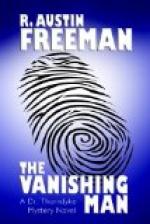“Here, of course, the vital question to be settled is, what is the latest instant at which it is certain that this person was alive? And the settlement of that question may turn on some circumstance of the most trivial and insignificant kind. There is a case in this morning’s paper which illustrates this. A gentleman has disappeared rather mysteriously. He was last seen by the servant of a relative at whose house he had called. Now, if this gentleman should never reappear, dead or alive, the question as to what was the latest moment at which he was certainly alive will turn upon the further question: ’Was he or was he not wearing a particular article of jewellery when he called at that relative’s house?’”
He paused with a reflective eye bent upon the stump of chalk that he still held; then, noting the expectant interest with which we were regarding him, he resumed:
“The circumstances in this case are very curious; in fact, they are highly mysterious; and if any legal issues should arise in respect of them, they are likely to yield some very remarkable complications. The gentleman who has disappeared, Mr. John Bellingham, is a man well known in archaeological circles. He recently returned from Egypt, bringing with him a very fine collection of antiquities—some of which, by the way, he has presented to the British Museum, where they are now on view—and having made this presentation, he appears to have gone to Paris on business. I may mention that the gift consisted of a very fine mummy and a complete set of tomb-furniture. The latter, however, had not arrived from Egypt at the time when the missing man left for Paris, but the mummy was inspected on the fourteenth of October at Mr. Bellingham’s house by Dr. Norbury of the British Museum, in the presence of the donor and his solicitor, and the latter was authorised to hand over the complete collection to the British Museum authorities when the tomb-furniture arrived; which he has since done.
“From Paris he seems to have returned on the twenty-third of November, and to have gone direct from Charing Cross to the house of a relative, a Mr. Hurst, who is a bachelor and lives at Eltham. He appeared at the house at twenty minutes past five, and as Mr. Hurst had not yet come down from town and was not expected until a quarter to six, he explained who he was and said he would wait in the study and write some letters. The housemaid accordingly showed him into the study, furnished him with writing materials, and left him.
“At a quarter to six Mr. Hurst let himself in with his latchkey, and before the housemaid had time to speak to him he had passed through into the study and shut the door.
“At six o’clock, when the dinner bell was rung, Mr. Hurst entered the dining-room alone, and, observing that the table was laid for two, asked the reason.
“‘I thought Mr. Bellingham was slaying to dinner, sir,’ was The housemaid’s reply.




